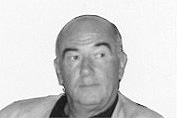Miroslav Jancic - in memory
by a family member
As a writer in exile in London, broken-hearted by events in his homeland of Bosnia in the 1990s, when nationalism viciously turned citizens against one another, Miroslav Jančić claimed to have had ‘an attack of poetry’. He wrote day and night to bring to light every aspect of the terrible confrontations, producing a number of extremely perceptive, but more than that, moving poems, never abandoning his humanity and his love of other human beings.

‘The single poem (from the anthology In the Company of Poets) that impressed me most - and which I'm likeliest to carry around with me for a while - is Miroslav Jančić's "His Biobibliography". Here among all the modesty and soft-speaking is a poet who does the Yeatsian thing and dramatizes his love-hate relationship with the nation (Bosnia) that gave him birth…Note that Jančić is not English. English poets these days don't have this kind of breadth of vision and lack of modesty…’ So Tony Grist described Jančić’s poetic voice in the New Hope International Review last year. Wayne Burrows, in Poetry London, echoed these reflections, calling Jančić’s poem an ‘eloquent meditation’.
Born on 2 September 1935 in Sarajevo to a nurse and a clerk, Jančić started his professional life as a journalist for the Sarajevan daily Oslobođenje, becoming the paper's London correspondent in the early sixties. It was in the UK that he developed his true calling - as a playwright - and returned to Sarajevo to become director of the Bosnian National Theatre, a post he held for several years.
Jančić's dreams and works were always linked to his native land and its cosmopolitan spirit. During the seventies he wrote and directed several plays on this theme, most celebrated of which were The Bosnian King, Kolo and The Guilty Herceg.
‘Jančić's plays were among the first to affirm the concept of Bosnianhood, while in his books he often predicted unfortunate events yet to come,’ remarked Bosnian academic Tvrtko Kulenović at the memorial service held for Jančić at the National Theatre in Sarajevo last Monday.
In addition to numerous plays, Jančić also wrote novels (The Prodigal Son, Tvrtko, The Lightening Bug) and works of non-fiction (The Last Ambassador, The Spokesman For Hell), all written, published or staged in Serbo-Croat, a language later renamed as Bosnian. His writings have been translated into English, Russian, Polish, Czech and Slovenian.
Jančić's love of Bosnia was reflected in his hatred of all forms of ethnic chauvinism. Following the publication of his novel How I Betrayed the National Cause (published ten years before the Bosnian war), describing his imaginary trial by ethnic chiefs, Jančić received numerous death threats. His confrontations with nationalist leaders of all ethnic groups brought him many enemies as well as friends on all sides.
Following his years with the National Theatre, Jančić's versatile professional life saw him as vice-mayor of Sarajevo, during which time he was awarded the city's highest medal of achievement. After serving as a member of the Bosnian parliament in the mid eighties, Jančić was posted as Yugoslavia’s ambassador to Ghana. He abandoned his post when Yugoslavia crumbled, entering his besieged Sarajevo in the summer of 1992, where he assumed the post of wartime spokesman for the Bosnian government.
Disagreements with the government he represented and personal threats from nationalists caused Jančić to leave Bosnia again in 1993 and emigrate to London. This is when a new stage in his creative life began - as a poet. He published two collections of poems in the English language, The Flying Bosnian and Singing Through the Town (Hearing Eye, 1996 and 2001). The International Library of Poets named Jančić among their best two hundred poets of 2004.
Jančić published works in various magazines (PEN International, Index on Censorship), on internet sites (www.poetry.com, www.poetsagainstwar.org.uk) and was included in a number of anthologies (The Bend On the Road, Home, Voices In the Wind, In the Company of Poets). His work also includes the translation into Bosnian of Adrian Hastings’s The Construction of Nationhood (Adamič, Buybook 2003).
Last year, the Bosnian Institute in London, together with Bricks, published Jančić's billingual book of twenty short stories from exile, Bosnia In Britain/Bosna izvan sebe. Jančić was subsequently awarded the UK Milennium Award Fellowship.
Jančić wrote poetry until the very end of his life. During the memorial service at the National Theatre in Sarajevo last Monday, excerpts were read from an as yet unpublished collection of his poems Home, Bloody Home. In the revised version of his favourite poem ‘Dear Margie Davis’, addressed to a cancer therapist, Jančić contemplates the social and medical roots of his incurable illness and the world he is leaving behind, realizing that nothing more can be done on his part to save it.
Although a naturalized British citizen, Jančić always desired to return to his native land. He died on 25 November 2004 from cancer, aged 69, in his city of Sarajevo, surrounded by loved ones. He is survived by his wife Mirjana and four children.
|